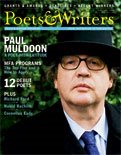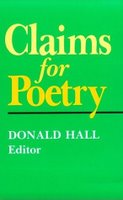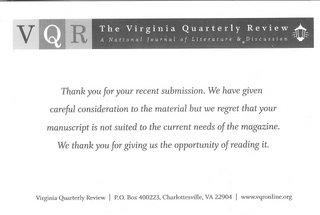This morning I finished re-reading Seamus Heaney's Death of a Naturalist, one of my favorite collections of his work. It's also the first book he published, at the age of 27. Given that my goal for the year is to ready a manuscript for publication, it occurred to me that I should take a closer look at other first books by poets I like to see how they pulled it off. If you have suggestions for particularly remarkable ones, let me know.
In the meantime, I will try to avoid thinking too much about the fact that Heaney wrote Death of a Naturalist when he was 27. On the one hand, very inspiring. On the other, hugely depressing.
Friday, December 15, 2006
Wednesday, December 13, 2006
Structuring My Time
I'm going to be spending about 30 hours a week on my regular job. Why 30 hours? Originally I envisioned working around 25, but earlier this fall I learned that I needed to work 30 in order to retain my benefits. So, 30 it is. Since I work from a home office and don't have to factor in commuting time, 30 still leaves me with a good amount of time for writing.
When my boss and I started talking about how to divide up those hours across the work week, I wasn't sure what would be best. Three full days? Five half days? I didn't have any immediate preference. I could see benefits to having two days a week to focus entirely on writing, but being able to write everyday was also attractive. As for the downsides, I worried a little that a whole day devoted to writing seemed like an intimidating expanse of time; on the other hand, I imagined that having only half days to work could be frustrating.
I did know that, if I was going to work half-days, I wanted to have the mornings to write. The organization I work for is fast-paced and it would be hard to stop work abruptly each day after I'd already started. Experience had also taught me that I did my best creative work first thing in the morning.
Ultimately, I left it up to my boss whether she wanted me to be available everyday (but only in the afternoons) or only three days a week (but all day). She decided she'd prefer the former. So I'll be writing from about 7 AM until noon, then starting work.
Now, one year is not a lot of time, so I want to be as productive as possible. To that end, I'm going to try to ensure my daily writing time is structured, by breaking it up into blocks of time for different purposes, without being overly rigid. Here's how I'm imagining the schedule now:
7:00 - 8:00 - Reading (poems/poetics)
8:00 - 8:15 - Breakfast
8:15 - 10:30 - Writing (new poems and/or revisions)
10:30 - 11:30 - Flexible (writing, submissions, letters/articles, blogging, etc.)
11:30 - 12:00 - Lunch
12:00 - 6:00 - Work
Of course, those are just my initial thoughts. I expect that schedule will change as I start doing the actual work, and I intend to be flexible. If I feel like starting a new poem at 7:30, I will (schedule be damned!). It feels a little silly adding breakfast and lunch in there, but hey, those things take up time and they have to happen. Else I get ornery.
When my boss and I started talking about how to divide up those hours across the work week, I wasn't sure what would be best. Three full days? Five half days? I didn't have any immediate preference. I could see benefits to having two days a week to focus entirely on writing, but being able to write everyday was also attractive. As for the downsides, I worried a little that a whole day devoted to writing seemed like an intimidating expanse of time; on the other hand, I imagined that having only half days to work could be frustrating.
I did know that, if I was going to work half-days, I wanted to have the mornings to write. The organization I work for is fast-paced and it would be hard to stop work abruptly each day after I'd already started. Experience had also taught me that I did my best creative work first thing in the morning.
Ultimately, I left it up to my boss whether she wanted me to be available everyday (but only in the afternoons) or only three days a week (but all day). She decided she'd prefer the former. So I'll be writing from about 7 AM until noon, then starting work.
Now, one year is not a lot of time, so I want to be as productive as possible. To that end, I'm going to try to ensure my daily writing time is structured, by breaking it up into blocks of time for different purposes, without being overly rigid. Here's how I'm imagining the schedule now:
7:00 - 8:00 - Reading (poems/poetics)
8:00 - 8:15 - Breakfast
8:15 - 10:30 - Writing (new poems and/or revisions)
10:30 - 11:30 - Flexible (writing, submissions, letters/articles, blogging, etc.)
11:30 - 12:00 - Lunch
12:00 - 6:00 - Work
Of course, those are just my initial thoughts. I expect that schedule will change as I start doing the actual work, and I intend to be flexible. If I feel like starting a new poem at 7:30, I will (schedule be damned!). It feels a little silly adding breakfast and lunch in there, but hey, those things take up time and they have to happen. Else I get ornery.
Saturday, December 09, 2006
About the "Rate the Rejection" Series
Before anything else, let me say that I have the utmost respect for literary magazine editors. They have a hard job that provides little recognition. Most face chronic budget limitations and a contracting base of subscribers, but they're also receiving more submissions than ever. So it's no surprise that they often take months to read what you send them and, when it's not up to par, return the kinds of generic rejection slips that anyone trying to get his or her work published knows so well. There's just not enough time or money, and no other way to survive.
Still, equally hard-working writers who do their best to respect literary magazines (by not submitting materials simultaneously to multiple journals, for instance) deserve to be treated humanely. So A Writing Year will hold them to account. I'll post all the rejection letters I get (though let's hope there aren't too many) and grade every one, looking at everything from the quality of their sentiment to the thickness of their paper. Egregiously long turnaround times are a pet peeve of mine, so I'll tell you how long they took to respond as well.
Here are the rejections I've rated so far. Check back often as I'm certain the list will grow over the course of the year in a depressingly fascinating way.
Still, equally hard-working writers who do their best to respect literary magazines (by not submitting materials simultaneously to multiple journals, for instance) deserve to be treated humanely. So A Writing Year will hold them to account. I'll post all the rejection letters I get (though let's hope there aren't too many) and grade every one, looking at everything from the quality of their sentiment to the thickness of their paper. Egregiously long turnaround times are a pet peeve of mine, so I'll tell you how long they took to respond as well.
Here are the rejections I've rated so far. Check back often as I'm certain the list will grow over the course of the year in a depressingly fascinating way.
Thursday, December 07, 2006
Count the Clock
It's official. On January 2 my writing year begins. Each day, I'll have the mornings to write before starting work for my regular job about noon. I'll post more on my thoughts for structuring my writing time in the next few days.
Tuesday, November 28, 2006
VQR Takes Note
Chalk one up for the rejected writers! A friend just pointed me to this posting in the Virginia Quarterly Review's official blog, which acknowledges the journal's long turnaround times for submissions lately and promises action. In fact, they even went so far as to apologize to your humble blogger directly. Sez VQR:
".... I’m trying to imagine watching an Oscar-nominated actress portraying the author reaction of a rejected author. I’m guessing she doesn’t take it as well as David Keeling. (By the way, David and all submitters, we apologize for taking so long to respond. We’ve been buried in submissions ever since our National Magazine Award nominations in March. I’m pleased to report that we’ve hired additional readers, we’re enlisting new interns, and we’ve just started using a spiffy new submission database that we hope will help us streamline our process.)"
Well, the apology won't get VQR a better rating, but my hat's off to them for caring enough to make their submissions process more efficient. Just another reason why it's among the best big journals out there.
".... I’m trying to imagine watching an Oscar-nominated actress portraying the author reaction of a rejected author. I’m guessing she doesn’t take it as well as David Keeling. (By the way, David and all submitters, we apologize for taking so long to respond. We’ve been buried in submissions ever since our National Magazine Award nominations in March. I’m pleased to report that we’ve hired additional readers, we’re enlisting new interns, and we’ve just started using a spiffy new submission database that we hope will help us streamline our process.)"
Well, the apology won't get VQR a better rating, but my hat's off to them for caring enough to make their submissions process more efficient. Just another reason why it's among the best big journals out there.
Thursday, November 02, 2006
And another thing...
Poets Gary Snyder, Yusef Komunyakaa, Philip Metres, Dunya Mikhail, Brian Turner, and Jorie Graham will be panelists for a discussion on poetry and war at the Chicago History Museum this Sunday at 3:30. Tix are $6 at the door or $5 in advance (call 312.494.9509 to reserve). With such an eclectic group of poets, this promises to be an interesting event.
Wednesday, November 01, 2006
Jimmy Santiago Baca Reading - Nov. 8
A quick alert to those in Chicago: At 6:30 on November 8, poet Jimmy Santiago Baca will be reading at the School of the Art Institute Ballroom (112 S. Michigan Ave). I think tickets are around $8 at the door. Sadly I will be out of town -- otherwise I would certainly be there. Baca's life story is a compelling and remarkable one (illiterate at 21, he began writing poetry during a five-year stint in a maximum security prison) that he recounts grippingly in his memoir A Place to Stand (Grove Press, 2001). Plus, he's a damn good poet. Go see the man speak.
Sunday, October 29, 2006
Considering an MFA?
I'm not doing an MFA program. Why I made that decision is a topic for another post, but I don't know that it was the right one and I don't think I will know until sometime next year, if ever. For now, I go merrily along down my own path.
 However, if you're thinking about trying out for the MFA squad, it's worth picking up a copy of the current issue of Poets & Writers (Nov/Dec 2006), which features a section on MFA programs, including a piece written by my friend Nell Henderson on the top five in the country. For those keeping score, they are currently the University of Iowa (#1), Johns Hopkins and the University of Houston (tied for #2), and Columbia and the University of Virginia (tied for #3). My money's on UVA to take out Hopkins in the finals.
However, if you're thinking about trying out for the MFA squad, it's worth picking up a copy of the current issue of Poets & Writers (Nov/Dec 2006), which features a section on MFA programs, including a piece written by my friend Nell Henderson on the top five in the country. For those keeping score, they are currently the University of Iowa (#1), Johns Hopkins and the University of Houston (tied for #2), and Columbia and the University of Virginia (tied for #3). My money's on UVA to take out Hopkins in the finals.
Nell is one of the smartest people I know, so it's no surprise that she brings some healthy skepticism to the task of comparing these programs to one another and to the central premise that creative writing programs can be objectively scored or ranked in the first place. I also appreciate her attention to one detail that is often, bewilderingly, brushed aside: the enormous costs of many of these programs, and to what extent these institutions are able to offset those costs.
Anyway, if you're considering applying for an MFA, check out Nell's article first. It'll give you a good sense of the top (ranked) programs and possibly get you thinking about some of the other issues and questions surrounding these programs as well.
 However, if you're thinking about trying out for the MFA squad, it's worth picking up a copy of the current issue of Poets & Writers (Nov/Dec 2006), which features a section on MFA programs, including a piece written by my friend Nell Henderson on the top five in the country. For those keeping score, they are currently the University of Iowa (#1), Johns Hopkins and the University of Houston (tied for #2), and Columbia and the University of Virginia (tied for #3). My money's on UVA to take out Hopkins in the finals.
However, if you're thinking about trying out for the MFA squad, it's worth picking up a copy of the current issue of Poets & Writers (Nov/Dec 2006), which features a section on MFA programs, including a piece written by my friend Nell Henderson on the top five in the country. For those keeping score, they are currently the University of Iowa (#1), Johns Hopkins and the University of Houston (tied for #2), and Columbia and the University of Virginia (tied for #3). My money's on UVA to take out Hopkins in the finals.Nell is one of the smartest people I know, so it's no surprise that she brings some healthy skepticism to the task of comparing these programs to one another and to the central premise that creative writing programs can be objectively scored or ranked in the first place. I also appreciate her attention to one detail that is often, bewilderingly, brushed aside: the enormous costs of many of these programs, and to what extent these institutions are able to offset those costs.
Anyway, if you're considering applying for an MFA, check out Nell's article first. It'll give you a good sense of the top (ranked) programs and possibly get you thinking about some of the other issues and questions surrounding these programs as well.
Friday, October 27, 2006
Practical Poetics
Over the last few years, I've become addicted to reading poets' accounts of the more quotidian side of writing -- how they got started, what they do when they get up in the morning, where they find inspiration, how they avoid bankruptcy, etc. I find these essays uniquely inspiring, perhaps mostly because they show that Charles Simic or Donald Hall or Galway Kinnell struggle (or once did) with some of the same challenges I do. I look to them for tips on self-discipline and survival. Those that focus on craft also make a good substitute for a writing class in a pinch.
 Props to The University of Michigan Press for almost single-handedly propelling this genre through its Poets on Poetry series, for which Donald Hall and David Lehman serve as editors. It includes dozens of books on writing by just about every major American poet. Especially noteworthy is Donald Hall's Claims for Poetry (originally published in 1982), an anthology of some of the best essays on poetics I've read yet. The essay that starts it off, A.R. Ammons' "A Poem Is a Walk," shifted my entire perspective on writing. If I were going to teach a class on writing poetry, I think Claims for Poetry would be the only required reading beyond actual poems.
Props to The University of Michigan Press for almost single-handedly propelling this genre through its Poets on Poetry series, for which Donald Hall and David Lehman serve as editors. It includes dozens of books on writing by just about every major American poet. Especially noteworthy is Donald Hall's Claims for Poetry (originally published in 1982), an anthology of some of the best essays on poetics I've read yet. The essay that starts it off, A.R. Ammons' "A Poem Is a Walk," shifted my entire perspective on writing. If I were going to teach a class on writing poetry, I think Claims for Poetry would be the only required reading beyond actual poems.
Plus, who could resist that retro green cover? The stick-on font? The two-tone urine-yellow lettering? The dorkiness is so overwhelming it's transcendent.
Anyway, more Poets on Poetry books will surely be on my own reading list for the coming year. If you have other recommendations, let me know.
 Props to The University of Michigan Press for almost single-handedly propelling this genre through its Poets on Poetry series, for which Donald Hall and David Lehman serve as editors. It includes dozens of books on writing by just about every major American poet. Especially noteworthy is Donald Hall's Claims for Poetry (originally published in 1982), an anthology of some of the best essays on poetics I've read yet. The essay that starts it off, A.R. Ammons' "A Poem Is a Walk," shifted my entire perspective on writing. If I were going to teach a class on writing poetry, I think Claims for Poetry would be the only required reading beyond actual poems.
Props to The University of Michigan Press for almost single-handedly propelling this genre through its Poets on Poetry series, for which Donald Hall and David Lehman serve as editors. It includes dozens of books on writing by just about every major American poet. Especially noteworthy is Donald Hall's Claims for Poetry (originally published in 1982), an anthology of some of the best essays on poetics I've read yet. The essay that starts it off, A.R. Ammons' "A Poem Is a Walk," shifted my entire perspective on writing. If I were going to teach a class on writing poetry, I think Claims for Poetry would be the only required reading beyond actual poems.Plus, who could resist that retro green cover? The stick-on font? The two-tone urine-yellow lettering? The dorkiness is so overwhelming it's transcendent.
Anyway, more Poets on Poetry books will surely be on my own reading list for the coming year. If you have other recommendations, let me know.
Friday, October 20, 2006
Rate the Rejection - Virginia Quarterly Review
First up, with the dubious honor of inaugurating the Rate the Rejection series: the Virginia Quarterly Review.
Now, VQR is probably my favorite literary journal of the moment. I'm fond of it not just because it hails from my hometown, Charlottesville, VA, but because editor Ted Genoways has completely overhauled it in a way that I believe demonstrates a new model for a successful, high-quality publication. VQR is innovative, sports full-color photos and graphics and consistently features an eclectic array of writers and styles that somehow always works perfectly. I've ordered subscriptions for friends and wholeheartedly recommend it to anyone. Seriously, you should do it now -- here's a link to the VQR website.
Getting my rejection note from VQR was hard, but not unexpected. I can only imagine that, with their newfound success, they are getting truckloads of submissions. But is their rejection note as professional as their product? To the slip!

Rating Summary: Printed on 3x5" cardstock, VQR's slip gets points for paper quality. It's not flimsy and the print is clear. The language itself is straightforward and succinct. But, in the end, what's most depressing about rejection slips is their cold, generic quality, and VQR's professionalism only seems to enhance that. I realize they can't give personalized feedback to everyone, but even a short hand-written note, along the lines of "sorry, totally wrong for us," or "maybe next time" would do. Getting something this perfunctory and uninformative seems especially harsh given how long they took to get back to me: five months! Sorry VQR, that'll cost you.
The Grade: C+. Just a touch above average. But responding faster might have gotten them within striking range of a B.
Click here for more about the Rate the Rejection series and links to other rejections I've rated.
Now, VQR is probably my favorite literary journal of the moment. I'm fond of it not just because it hails from my hometown, Charlottesville, VA, but because editor Ted Genoways has completely overhauled it in a way that I believe demonstrates a new model for a successful, high-quality publication. VQR is innovative, sports full-color photos and graphics and consistently features an eclectic array of writers and styles that somehow always works perfectly. I've ordered subscriptions for friends and wholeheartedly recommend it to anyone. Seriously, you should do it now -- here's a link to the VQR website.
Getting my rejection note from VQR was hard, but not unexpected. I can only imagine that, with their newfound success, they are getting truckloads of submissions. But is their rejection note as professional as their product? To the slip!

Rating Summary: Printed on 3x5" cardstock, VQR's slip gets points for paper quality. It's not flimsy and the print is clear. The language itself is straightforward and succinct. But, in the end, what's most depressing about rejection slips is their cold, generic quality, and VQR's professionalism only seems to enhance that. I realize they can't give personalized feedback to everyone, but even a short hand-written note, along the lines of "sorry, totally wrong for us," or "maybe next time" would do. Getting something this perfunctory and uninformative seems especially harsh given how long they took to get back to me: five months! Sorry VQR, that'll cost you.
The Grade: C+. Just a touch above average. But responding faster might have gotten them within striking range of a B.
Click here for more about the Rate the Rejection series and links to other rejections I've rated.
What This Is All About
For a long time now, I've wanted more time to work on my own writing. Now I have an opportunity. I'm cutting back my hours at my full-time job for at least a year, with the goal of producing a collection of poems ready for publication. To keep myself motivated and productive, I'm thinking of this experience as a kind of do-it-yourself MFA program and an experiment in balancing life, work and writing outside of an academic environment.
Thus, "A Writing Year." I plan to use this blog to document the process from start to finish. In other posts I'll talk more about my decision, my goals, how I worked things out with my boss, and so on. As I was preparing for this year, I was struck by how few resources are available to anyone who wants to write on their own. If things go well, I hope that this blog helps fill that void.
Thus, "A Writing Year." I plan to use this blog to document the process from start to finish. In other posts I'll talk more about my decision, my goals, how I worked things out with my boss, and so on. As I was preparing for this year, I was struck by how few resources are available to anyone who wants to write on their own. If things go well, I hope that this blog helps fill that void.
Subscribe to:
Comments (Atom)

